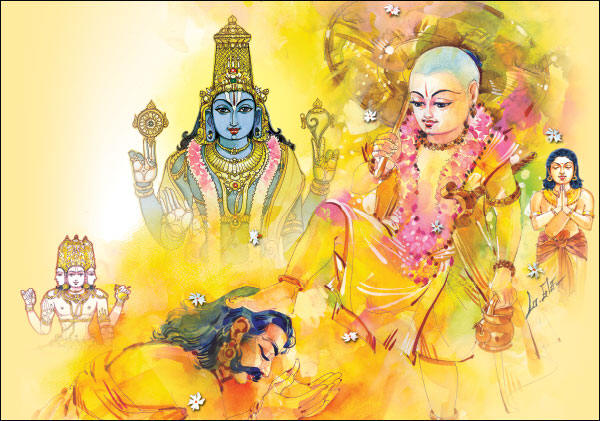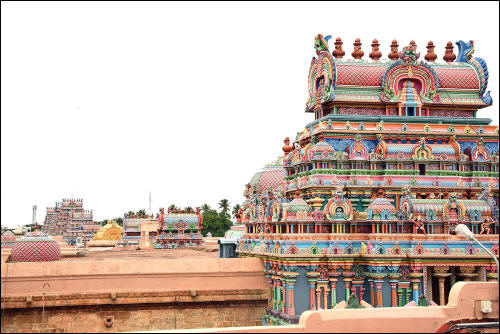
16Rangarajyam
Posted Date: 06:00 (06/11/2018) November 6, 2018 Sakthi Vikatan

Paurāṇikar (Explicator of Puranas) explained the temple worship, rites and rituals to the Parrot King and incidentally also to all the assembled people. He described the five states of Emperuman, the how, the why of temple worship and the accrued benefits thereof.

Another Paurāṇikar, wading through the pages intently and knowingly, said, “Now I will narrate to you the greatness of Tiruvaraṅga Temple as it relates to the life of humanity. This Tiruvaraṅgam is the first temple in the Bhūlōkam. It will be the biggest temple in size and also is the Bhuloka Vaikuntam. The visitor to the temple will be called Mumukṣu (One eager for salvation). When the Mumukṣu comes for the Darśan of the temple, he is like the prospective candidate for Paramapatham going through and past the six worlds. The six circumambulatory pathways are like the six worlds.
“The seventh circumambulation is known as Kaliyuga Raman circumambulation. The sixth walk-around is known as Vikrama Cholan Holy circumambulation; the fifth, Akaḷaṅkaṉ holy circumambulation; the fourth, Ālinātaṉ holy circumambulation; the third, Kulasēkaraṉ holy circumambulation; the second, Rājamahēndiraṉ holy circumambulation; and the first, Dharmavarma circumambulation.”
The Paurāṇikar continued his description, “A person, with devotion to Araṅgaṉ taking a ritual bath in the Kaveri river, going on the seven circumambulatory paths and doing Darśan of Araṅgaṉ, becomes free of births and gains redemption. With every circumambulation, the Bhuloka Vaikunta Temple’s Sānithyam (Divinity and spirituality) comes into contact with the principal Nāḍīs (Energy Flow Channels). Prana cleanses the Sabda Nāḍīs. Because of the activity of the Nāḍīs, the in-dwelling Ātmā like the peeled banana is divested of Malams (impurities) and the body and reaches Paramātma at the end of life. By associating the body with the structure of the temple, he brought his explanation to a close.
Kiḷi Cholan because of spiritual instructions attained a higher spiritual state. Nīlivaṉa Mahaṛṣi instructed the king on the other seven Avatara stories: Narasimam, Vāmaṇam, Parasurāmam, Rāmam, Kṛṣṇam, Balarāmam, and Kalki.
In Vāmaṉa Avatār associated with King Bali, the thrust of the story is that man should not have the egoism of I-ness. The story extols the greatness and loftiness of Emperuman.
Vamanāvatāram is a life lesson for Kiḷi Cholan! This story on close look raises many questions. The answers are also multitudinous. It is common knowledge Vamanāvatāram brings us the memory of King Bali.
A Ṛṣi gave a Kālakṣēpa in Arjuna Mandapam and told the audience that Araṅgaṉ the Mahavishnu took Vamana Avatara twice. Kiḷicholan’s wonder and surprise were sky-high.
The king: “Mahaṛṣi! Some wonder this is! One Avatar twice?
.Ṛṣi: Our Araṅgar will take a 1000 Avatars, if necessary. Looking at his Archāvatāra form, we should come to a false and ignorant conclusion, “Isn’t he in sleep?”
King Kiḷi Cholan: Wonderful! Please tell us the first of the Vāmaṉa Avatāra. Could I interrupt you with questions?”
Ṛṣi: By all means. Good questions cause good answers. Good answers bring clarity.
King Kiḷi Cholan: “Much happiness. Let me hear you tell the first of Vamana Avatara unknow to anyone.”
As King Kiḷi Cholan was ready, in the temple’s Arjuna Mandapam, the first Vāmaṇam (the story) took on the likes of a deluge.

Ṛṣi: Asura Thunthu was the son of Kāśyapa Muni. There is no compulsion that the sons of Muni must be born Munis. The present birth is the direct cause of Karma of previous birth. It is the fruit of Kāśyapa’s wicked karma that Thunthu was born an Asura. His Asura qualities were immense: irascibility, selfishness, prolonged sleep, and excessive sexual proclivity. He was the epicenter of these wicked qualities.
Thunthu was jealous of Devas with Varasiddhi (Realization of boons). He asked his father Kasyapa why there was so much of difference between them and other Devas and why they are so splendorous. Kasyapa first laughed and later answered his son.
Kasyapa: “My son! Male and female are the two genders among humankind. Likewise, there are Devas and Asuras according to their Guṇas or qualities. Devas have a plethora of soul force (Ātma Sakthi). The Asuras have immense bodily (physical) power. When spiritual power increases, the splendor comes automatically.”
Thunthu: “What should be done to increase Ātma Sakthi?”
Kaśyapa: “Control your organs and perform Tapas (Austerity).”
Thunthu: “That is all to it.”
Kaśyapa: “It is not just that simple. Control over passions does not come easy. The more you suppress it, the more it gushes.
Thunthu: “If that is so, how did they accomplish it?”
Kaśyapa: “Son! You also could try. Mental strength is necessary. That is, it.”
As Kaśyapa told him so, Thunthu immersed himself in Tapas. Kaśyapa was happy in the prospect of his son becoming a Muni. As if he exceeded his father, Thunthu immersed in Tapas, received Darśan of Brahma.
Thunthu asked for immortality.
Brahma: “It is not possible. Ask me something similar to it.”
Thunthu: “In this world, no weapon, no Deva, no Muni and none of the Holy Triad (Brahma, Vishnu, and Siva) could inflict any harm to me.”
Brahma gave him that boon.
Brahma: “So be it.” Saying Thathāsthu (Amen; So be it.) Brahma disappeared.
As the Ṛṣi was narrating the story, Kiḷi Cholas popped a question, “Maharishi, Is this boon equal to immortality?”
Ṛṣi: “No doubt about it.”
The king: “If that is so, Brahma could have given him the boon of immortality.”
Ṛṣi: King Chola! Of all the boons immortality is the worst. Nothing is harsher, crueler and severer than immortality. The first problem is the endless procession of immortal beings from him or her and the oppressive density of people in the world. There won’t be standing room. No one can destroy the other. That is no impetus to do daily work for a living. There will be no wars and no disputes. There will be no murder and no victory from killing.”
The king: “What you say is that the world will suffer from overpopulation.”
Ṛṣi: “Where is the doubt?”
The king: “How can one think that a boon given to one Asura could change the world like this.”
Ṛṣi: “It is possible if everyone does Tapas like Thunthu.”
The king: “Only if everyone does.”
Ṛṣi: “A promise of immortality will be enough to drive the people of the world into Tapas. Would the boon getter be a danger for life and liberty for others?”
The king: “All right. What happened next?”
Ṛṣi: “What happened! It was a riot. Keeping the Varasiddhi as the centerpiece, Thunthu began to control and rule Brahma Loka.”
King: “What an atrocity.”
Ṛṣi: “Asuram is always like this.”
King: “Then.”
Ṛṣi: “What next! What can happen? Brahma along with Indra and others went to Vaikuntam and offered their homage at his lotus feet.”
There was no way to suppress or destroy Thunthu, who had in his possession the boon that no one could vanquish or destroy him. Unlike others in the world, Mahavishnu morphed into Vāmaṉa (dwarf) Brahmana. Then Thunthu was getting ready to perform Aśvamedha Yāgam (Horse sacrifice).
King: “Why Aśvamedha Yāgam for one who has Varasiddhi?”
Ṛṣi: “Varasiddhi is for the body and the life. It does not influence the title, the office, and the authority. Thunthu desired to attain the suzerainty of Indra. For it, 100 horse sacrifices are mandatory. Thunthu was getting ready for the sacrifice.”
King: “Could that be the reason why Indra fell at the feet of Tirumal (Vishnu)?”
Ṛṣi: “Yes. Thunthu desired to perform Yāgam like this to usurp the power of the Devas, distribute the power among the Asuras and make the Devas as slaves of Asuras.”
King: “Cruelty.”
Ṛṣi: “Because it is cruel, we call that kind of behavior Asuram.”
King: “What did Vishnu do in the name and the guise of a Dwarf?”
Ṛṣi: “He did a beautiful stratagem.”
King: “Stratagem-what is it?”
Ṛṣi: “Thunthu was bathing in the Dēvikā river. At that time, Vishnu pretended to commit suicide by drowning.”
King: “What an act?”
Ṛṣi: “Yes, Thunthu came close to the drowning dwarfish Brahmana and asked him: “Hey Dwarfish Brahmana, what happened. Are you desirous of committing suicide?”
Thunthu: You are a lucky man. You are the emperor of the world. The Holy Triad fear you. I am a famished pauper. My brother usurped all my properties and now made me jump into the river. Upon challenge, he said people like me deserve no share in the family property. It is not my fault to be born a dwarf. You tell me.”
Vāmaṉa’s talk moved Thunthu. He desired that everyone must conduct oneself as one pleased. Vamana’s speech sent Thunthu to a boiling point.
Thunthu: Hey You Short Brahmana! I will make you live it up before your brother. Ask me what you need from me. I must offer Dhāṉam to the Brahmanas because of Aśvamedha Yāgam. That gift will be yours to keep.”
King: “Then.”
Ṛṣi: Vāmaṉalīla played out. Kiḷi Cholan was eager to hear of the wonderful Līlā (mischievous play by a God) by Vāmaṉa.
Will Continue.
77-255-255